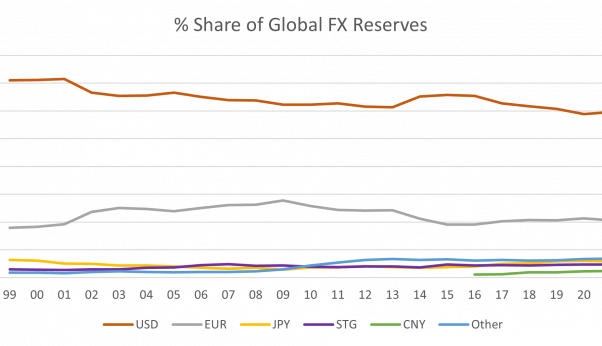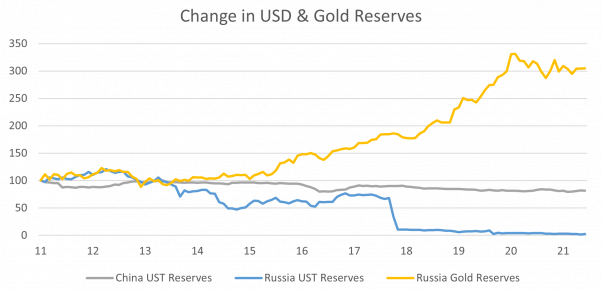
Kevin Gray
Chief Investment Officer
![]() 5 min read
5 min read
World In Motion
World In Motion
‘You’ve got to hold and give, but do it at the right time. You can be slow or fast, but you must get to the line.’
– World In Motion, New Order, 1990
‘It seems that our American partners are making a colossal strategic mistake undermining the credibility of the dollar as a universal and the only reserve currency today. They are undermining faith in it. They really are taking a saw to the branch they are sitting on’
– Vladimir Putin, March 2022
‘In a country ruled by an autocracy, with a completely enslaved press, in a period of desperate political reaction in which even the tiniest outgrowth of political discontent and protest is persecuted, the theory of revolutionary Marxism suddenly forced its way into the censored literature before the government realised what had happened and the unwieldy army of censors and gendarmes discovered the new enemy and flung itself upon him.’
– Lenin, 1901
‘What we call the beginning is often the end, and to make an end is to make a beginning.’
– Little Gidding, TS Eliot, 1942

The horrors of World War II heralded a global order centred around three central tenets:
- Equal sovereignty of states
- Internal competence for domestic jurisdiction
- Territorial preservation of existing boundaries
It is very recent history in which invasions and empire building were par for the course. Much of the world’s progress and prosperity over the past 70 years has been built on globalisation made possible by the underlying assumption that threats to territorial integrity were largely consigned to the past.
Civil wars, unfortunately, were considered to fall under the realm of self-determination and so have persisted all too frequently, often to the devastation of those caught in them.
The above assumptions have allowed global citizens to benefit from a ‘peace dividend’ as countries’ spending on defence as a proportion of GDP has fallen dramatically and allowed for higher spend on education, healthcare and other public services.
Wladimir Putin’s invasion of Ukraine has cast doubt over these assumptions, cast doubt over the very framework on which the international community is built, and thus has incurred an international reaction not seen since the Second World War.
The invasion of Ukraine, and just as importantly the reaction to it, has seismicramifications for the global order as it is currently understood.
Those ramifications will become better understood in the years to come, but one area of focus is the role of the US dollar as the global reserve currency. It is not news that the monetary hegemony that the US has enjoyed for decades has been gradually declining; the USD share of global FX reserves has already fallen from above 70% to below 60% in the past 20 years, but events this year may have put the final nail in the dollar’s coffin on the global stage, however gradual that death is.

Source: IMF, Fortem Capital
To understand this, one has to first take a trip through economic history to see how the USD first achieved its status.
Bretton Woods
At the end of WWII, there was a requirement for a new global monetary system. Two proposals were put forward, one by John Maynard Keynes, and the other a more USD centric idea.
Keynes argued that there would be a basket of commodities, Bancor, that would be a neutral reserve asset designed to settle trade between nations. Any creditor nation, which sold more than it bought, would run a Bancor surplus, which it would sell to buy its own currency; currency strengthens. A nation in deficit would need to sell their own currency to buy Bancor to settle trades; currency weakens. This in effect would have been self regulation of currencies relative to the deficits that their nations ran.
Harry Dexter White, Chief International Economist of the US Treasury, put forward a proposal with the dollar at the centre, pegged to gold, and other currencies pegged to the dollar.
An iteration of the second proposal was adopted and the Bretton Woods System was born, with the dollar pegged to gold, and became operational in 1958.
The Death of Bretton Woods and the Birth of the Petrodollar
The US encountered a problem in the late 50s and 60s as Europe and Japan woke from their slumber, ran surpluses, and drained America of the gold reserves it had built.
In 1971, with US inflation nearing 6% and growth falling (sound familiar?), Nixon shocked the world by abruptly breaking the link between the dollar and gold; the current era of fiat currency was entered into. Perhaps what was to transpire some years later was best surmised by John ‘Typhoon’ Connelly, the US Treasury Secretary at the time, who explained to his counterparts at the Rome G10 Summit of 1971 that ‘the dollar is our currency, but it’s your problem.’
The system entered a fairly chaotic time, but the 1973 oil crisis presented the US with an opportunity; Henry Kissinger proposed that Saudi, and therefore OPEC, would only take dollars for their oil in exchange for military security guarantees. This meant that all of the world’s net energy importers would need dollars to buy their oil, an almost insatiable demand, and would allow the US to run ever increasing deficits without the devaluation of its currency. The US dollar/ petrodollar became the world’s global reserve currency; the US was very much having its cake and eating it.
The Global Economic Custodians 1974 – 2005
With great power comes great responsibility.
Now that the price of oil was effectively pegged to the dollar, the dollar needed to be managed for the world rather than just America, which was now effectively in charge of global inflation.
This was never more apparent than in 1979 at an IMF meeting in Yugoslavia. Oil had spiked to $140 in today’s money; nations paying for their oil in dollars (everybody) were hurting. Paul Volcker, the Fed Chair, was told in no uncertain terms by the US’ creditors (everybody) that they expected the US to act. Volcker took interest rates to 15%, to the detriment of the US economy which entered recession, but effectively saving the dollar oil-price-dependent global economy.
The US behaved as the custodians of the global reserve currency might be expected to.
Oil went through a period of relative stability until 2005 when the global economic boom, epitomised by the rise of the oil hungry Chinese manufacturing behemoth, meant that oil rose, and kept going, in dollar terms.
The First Nail in the Coffin
A combination of oil hungry developing economies, tensions in the Middle East and muted production caused oil prices to spike heavily from 2005-2008, peaking at $140. Again, energy importers were hurting at a time when economic growth was also slowing.
The US once more had a choice, Ben Bernanke this time rather than Paul Volcker. His problem was that the spike in oil prices coincided with a deepening sub-prime mortgage crisis in the US. Would he raise rates and act as the global economic custodian, or cut them to save the domestic US economy?
Readers will be aware of what transpired. Volcker managed the dollar as the global reserve currency, Bernanke as America’s domestic currency.
China in particular, as the worlds major importer of oil, was particularly badly affected by the high prices. For any autocracy, the main risk to the regime is civil unrest, and there is nothing like a serious bout of inflation to increase the likelihood of it (sound familiar?).
China made noises about preferring a system that sounded much like Keynes’.
From there, there have been numerous statements from different sources about the potential need for change to the petrodollar system, but a very slow move away.
The Final Act

Source: Fortem Capital
Putin has clearly made a number of miscalculations with the decision to invade Ukraine.
Firstly, in his nostalgia for the former Soviet Union, he was told and believed that the Russian tanks would be greeted with flowers being flung from pavements lined with Russian flags being waved by the people of a ‘country’ that longed to be returned to the bosom of Mother Russia.
Secondly, perhaps as a result of the culture wars that are tearing the western world apart, he did not think that any coordinated policy response was likely from a fractured West. The annexation of Crimea in 2014 undoubtedly played a role in this assumption. He would have at least banked on Europe’s reliance on Russian energy to mean sweeping sanctions were unlikely.
However, the response has been swift and severe, with none more major (and possibly surprising) than the freezing of Russia’s FX reserves. It cannot be overstated how seismic a move this was, effectively it is the US and Europe defaulting on their obligations to Russia.
It is certainly not for this publication to argue as to whether it was the right thing to do, but the freezing of Russia’s foreign reserves is likely to permanently alter the way in which the international community thinks of reserve assets. This time it was the invasion of a sovereign nation which gave cause for the West to tell Russia that their dollars, euros & pounds were worthless. For other nations that rely on foreign reserves there will now be a question as to whether failing to meet emissions standards, having a questionable human rights record etc might lead to similar sanctions in the future; it is a risk some will be unwilling to stomach.
China introduced yuan-priced oil contracts in 2018 to facilitate a move away from the petrodollar, but to little avail. However, the Wall Street Journal suggested in March that Saudi Arabia were considering allowing China, who buy 25% of the oil that Saudi exports, to pay for it in yuan as well as including yuan-denominated futures contracts (petroyuan) in Aramco’s pricing model. It is no coincidence that China’s courtship of Saudi has accelerated at the same time as relations between the Kingdom and the Biden regime have become more strained.
Conclusion
For decades investors, and indeed humans generally speaking, have been blessed to live in a world that has been largely peaceful, at least by historic standards, and incredibly prosperous. Low rates have been accompanied by low inflation, and globalisation has brought an economic connectivity that would have previously been scarcely believable. The financialisation of assets has been a seemingly irreversible juggernaut.
Until now.
Events this year have turned the financial and geopolitical world on its head. The ramifications of this are likely to be felt for years to come. An inflationary war has heaped fuel onto an inflationary fire that was already burning brightly.
In the more immediate future, there is an administration in the US that plans record fiscal spending at the same time as its own central bank attempts to begin to shrink its own grossly inflated balance sheet. The US needs external buyers of treasuries in order to fund that spending, it may be on the way to losing foreign buyers that it currently relies on.
The idea that an empire can end tends to be inconceivable to those living through its crescendo. Investors would do well to remember that there were many empires that came before the current American one; they all eventually fell.
DISCLAIMER
– This document has been issued and approved as a financial promotion by Fortem Capital Limited for the purpose of section 21 of the Financial Services and Markets Acts 2000. Fortem Capital Limited registration number 10042702 is authorised and regulated by the Financial Conduct Authority under firm reference number 755370.
– This document is intended for Professional Investors, Institutional Clients and Advisors and should not be communicated to any other person.
– The information has been prepared solely for information purposes only and is not an offer or solicitation of an offer to buy or sell the product.
– Data is sourced from Fortem Capital Limited and external sources. The data is as at the date of this document and has been reviewed by Fortem Capital Limited.
– Information, including prices, analytical data and opinions contained within this document are believed to be correct, accurate and derived from reliable sources as at the date of the document. However, no representation or warranty, expressed or implied is made as to the correctness, accuracy or validity of such information.
– Fortem Capital Limited assumes no responsibility or liability for any errors, omissions or inaccuracy with respect to the information contained within this document.
– All price and analytical data included in this document is intended for indicative purposes only and is as at the date of the document.
– The information within this document does not take into account the specific investment objective or financial situation of any person. Investors should refer to the final documentation and any prospectus to ascertain all of the risks and terms associated with these securities and seek independent advice, where necessary, before making any decision to buy or sell.
– The product may not be offered, sold, transferred or delivered directly or indirectly in the United States to, or for the account or benefit of, any U.S. Person.
– The Fortem Capital Progressive Growth Fund is a Sub-Fund of Skyline, an open-ended investment company with variable capital incorporated on 1 June 2010 with limited liability under the laws of Ireland with segregated liability between Funds. The Company is authorised in Ireland by the Central Bank of Ireland pursuant to the UCITS Regulations.
“NOTICE TO INVESTORS DOMICILED OR RESIDENT IN
SWITZERLAND – The interests in the UCITS Fund and any related services, information and opinions described or referenced in this document are not, and may not be, offered or marketed to or directed at persons in Switzerland (a) that do not meet the definition of “qualified investor" pursuant to the Swiss Federal Act on Collective Investment Schemes of 23 June 2006 (“CISA") (“Non-Qualified Investors"), or (b) that are high net worth individuals (including private investment structures established for such high-net worth individuals if they do not have professional treasury operations) that have opted out of customer protection under the Swiss Federal Financial Services Act of 15 June 2018 (“FinSA") and that have elected to be treated as “professional clients" and “qualified investors" under the FinSA and the CISA, respectively (“Elective Qualified Investors").
In particular, none of the information provided in this document should be construed as an offer in Switzerland for the purchase or sale of the interests or any related services, nor as advertising in Switzerland for the interests or any related services, to or directed at Non-Qualified Investors or Elective Qualified Investors. Circulating or otherwise providing access to this document or offering, advertising or selling the interests or any related services to Non-Qualified Investors or Elective Qualified Investors may trigger, in particular, approval requirements and other regulatory requirements in Switzerland.
This document does not constitute a prospectus pursuant to Articles 35 et seqq. FinSA and may not fulfill the information standards established thereunder. No key information document pursuant to Swiss law has been established for the interests. The interests will not be listed or admitted to trading on a Swiss trading venue and, consequently, the information presented in this document may not fulfill the information standards set out in the relevant trading venue rules."
For more information on the investment philosophy or any of Fortem’s investment offerings, please do not hesitate to contact the team, we would be delighted to hear from you

 ABOUT
ABOUT